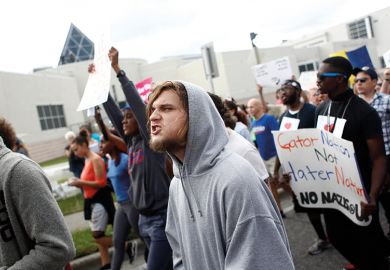When the chancellor of the University of Wisconsin-La Crosse invited a porn star turned sex educator as a speaker, it seemed destined to turn into yet another of the many headline-grabbing controversies over free speech on US campuses that have cropped up in the divided era of Donald Trump.
“‘It’s OK to like porn’: porn star Nina Hartley lectures UW-La Crosse students on sex, adult entertainment,” the local newspaper was, in fact, trumpeting within hours.
But as the controversy spread, something new bubbled to the surface in this case that was different from many others: the chancellor’s boss, the system president, told him angrily in a private reprimand that later became public that the incident could affect the public university’s state funding, and would almost certainly cost the chancellor a raise.
It’s no surprise that university officials worry as much about the financial consequences of such controversies as they do about whether free speech should be encouraged or offensive speech shut down, said Henry Reichman, chair of the American Association of University Professors’ committee on academic freedom and tenure.
“Underlying their concerns are image, budget, things like that,” said Professor Reichman. “Many of them, the first gut reaction is: ‘How do we protect the institution?’”
What was unusual about this case, he said, was “how blatant it was”.
Professor Reichman, an emeritus professor of history at California State University, East Bay, added: “This is how higher education is approaching things. They look at the bottom line. They’re just usually not as crass and as crude as this La Crosse thing.”
The chancellor, Joe Gow, invited the adult film star to speak as part of National Freedom of Speech Week. Ms Hartley, who appeared in My Bare Lady and more than 1,000 other movies and had a role in 1997’s Boogie Nights, now advocates for sex education and free expression; she has also spoken at Harvard University and Dartmouth College.
In the resulting firestorm, system president Ray Cross upbraided Professor Gow in a letter, saying that the event “puts all of our funding at risk. I fear your actions also detract from our budget request and our capital plan, which should be one of your highest priorities.” He said that the incident would affect Professor Gow’s scheduled salary increase, too.
Professor Gow has since apologised and personally reimbursed the university for Ms Hartley’s $5,000 (£3,925) appearance fee. He also agreed to invite a speaker to the campus from an organisation that researches and publicises the harmful effects of pornography.
There have been several examples of how campus speech disputes do, in fact, risk alienating not only people on both ends of the political spectrum, but donors, prospective students and the legislators who hold the purse strings to public university budgets.
Tennessee state lawmakers who were angry about an annual “Sex Week” on a University of Tennessee campus that includes gay-themed and “sex-positive” programming but also HIV testing and discussions of abstinence – paid for by donations – stripped $436,000 from the university’s Office of Diversity and Inclusion.
The president of private Trinity College in Connecticut said that it lost $200,000 in donations and that 16 tuition-paying students had withdrawn after a sociology professor retweeted, with the hashtag #LetThemFuckingDie, a story about the shooting of Republican congressmen practising for a baseball game; the story urged indifference to the fates of what it called bigots. The professor apologised and said that he was not advocating violence.
New York’s state senate passed a bill blocking student groups from getting state funding if they advocated boycotts of Israel; and, while that measure stalled, legislators also threatened to cut the budget of the public City University of New York after calls by pro-Israel advocates to ban the group Students for Justice in Palestine.
South Carolina legislators upset when two public universities required freshers to read LGBT-themed books passed a provision ordering the institutions to spend the same amount teaching the US constitution and other founding documents and on “the study of and devotion to American institutions and ideals”.
And a conservative group called Nebraska Taxpayers for Freedom urged cutting spending on diversity, LGBT and women’s, ethnic, black and Latino studies programmes after a graduate student held a sign that said “Just say NO! to neo-Fascism” and made an obscene gesture in front of a recruiting table for a right-wing organisation.
“There’s a perception that campus censorship is partisan,” said Joe Cohn, policy director for the Foundation for Individual Rights in Education. The reality, he said, is that “most of the censorship is over the institution protecting itself from controversy”.
POSTSCRIPT:
Print headline: Porn star’s talk ‘put bottom line at risk’
Register to continue
Why register?
- Registration is free and only takes a moment
- Once registered, you can read 3 articles a month
- Sign up for our newsletter
Subscribe
Or subscribe for unlimited access to:
- Unlimited access to news, views, insights & reviews
- Digital editions
- Digital access to THE’s university and college rankings analysis
Already registered or a current subscriber?








